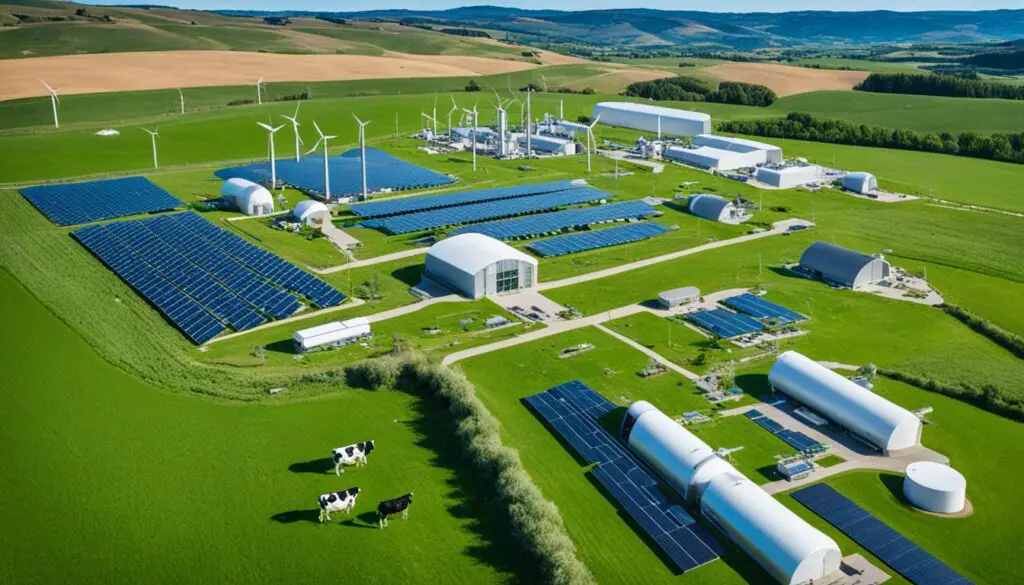Welcome to an exciting era where futuristic solutions and cutting-edge realities merge to revolutionize industries. In this article, I will explore how digital transformation is shaping the future of the agriculture industry, with a specific focus on sustainability and ESG strategies in the dairy sector.
As the global population continues to grow, the demand for food production increases exponentially. To meet these challenges, farmers are turning to smart agriculture solutions that leverage advanced technology such as big data, AI, cloud computing, and the Internet of Things (IoT). These innovative tools enable farmers to track, monitor, automate, and analyze agricultural operations like never before.
For the dairy industry, embracing digital solutions is a game-changer. The intersection of digital transformation and sustainability offers tremendous opportunities for dairy companies. By implementing technology on farms, they can significantly reduce their carbon footprint, improve efficiency, and ensure regulatory compliance. Embracing sustainable practices is not only essential for environmental responsibility but also for long-term success and meeting ESG reporting obligations.
Table of Contents
Key Takeaways:
- Futuristic solutions like digital transformation are reshaping the agriculture industry.
- Smart agriculture utilizes advanced technology to track, monitor, automate, and analyze agricultural operations.
- The dairy sector has the opportunity to benefit from the convergence of digital transformation and sustainability.
- Implementing technology on farms can significantly reduce the carbon footprint of the dairy industry.
- Embracing sustainable practices is crucial for long-term success and meeting ESG reporting obligations.
The Importance of Sustainable Practices in the Dairy Sector
The dairy sector plays a crucial role in the global agricultural landscape, providing essential products for consumption worldwide. However, as the industry continues to grow, it faces increasing challenges in terms of sustainability and environmental impact. Implementing sustainable practices in the dairy sector is not only necessary but also beneficial for long-term success and environmental stewardship.
The dairy sector has made significant progress in reducing on-farm emissions through various sustainable practices. Improved feed efficiency, optimized manure management, and the adoption of renewable energy sources have all contributed to reducing greenhouse gas emissions in the dairy sector. By embracing these sustainable practices, dairies can effectively lower their carbon footprint and contribute to overall environmental stewardship within the agricultural industry.
“Sustainability management solutions enable dairies to capture real-time data, increase efficiencies, and reduce greenhouse gas emissions.”
Implementing sustainability management solutions is vital in achieving these sustainable practices. These solutions facilitate the capture of real-time data, enabling dairies to monitor and analyze their environmental impact. By accurately tracking and measuring key metrics, such as greenhouse gas emissions, water usage, and energy consumption, dairies can identify areas for improvement and implement targeted strategies to further reduce their environmental footprint.
Benefits of Sustainable Practices in the Dairy Sector
Adopting sustainable practices in the dairy sector goes beyond meeting regulatory obligations. It also provides several additional benefits:
- Environmental Stewardship: By reducing greenhouse gas emissions and minimizing environmental impact, dairies can demonstrate their commitment to responsible agriculture and contribute to a healthier planet.
- Operational Efficiency: Sustainable practices often lead to increased operational efficiency and cost reductions. For example, optimizing feed efficiency not only reduces emissions but also lowers feed costs.
- Consumer Preference: Consumers are increasingly concerned about the environmental impact of the products they consume. Dairies that prioritize sustainability can attract environmentally conscious consumers and gain a competitive advantage in the market.
- Long-Term Viability: Incorporating sustainable practices positions dairies for long-term success, as sustainability and environmental responsibility become integral aspects of business operations.
“Sustainable practices are necessary for the dairy industry to fulfill reporting obligations and make positive contributions to the world.”
The dairy sector has a unique opportunity to lead the way in sustainable agriculture. By embracing sustainable practices, implementing effective sustainability management solutions, and prioritizing environmental stewardship, dairies can create a more sustainable and resilient future for themselves and the planet.
Leveraging Digital Solutions for ESG Reporting in the Dairy Industry
In today’s rapidly changing business landscape, dairy businesses are increasingly recognizing the importance of incorporating digital solutions to effectively manage their environmental, social, and governance (ESG) reporting obligations. By leveraging digital tools, dairies can streamline their sustainability practices, measure their environmental impact, and showcase their commitment to sustainable farming practices.
One of the key benefits of implementing a sustainability management solution is the ability to calculate and monitor the environmental impact of dairy operations. With digital platforms, dairies can track their energy consumption, water usage, and greenhouse gas emissions, allowing them to identify areas for improvement and make informed decisions to minimize their environmental footprint. These solutions also enable dairies to measure sustainability metrics such as energy efficiency, waste management, and biodiversity conservation, providing them with valuable insights to drive continuous improvement.
A sustainability management solution categorizes digital tools into different modules, allowing dairies to focus on one area at a time. Whether it’s optimizing water usage, improving waste management, or enhancing energy efficiency, dairies can tailor their sustainability efforts based on their specific needs and priorities. This modular approach ensures quick adaptation to changing environmental regulations and industry standards, empowering dairies to stay ahead of the curve and drive meaningful change.
By embracing digital solutions for ESG reporting, dairies can not only fulfill their sustainability commitments but also enjoy a range of business benefits. Lower operating costs, improved resource allocation, and streamlined reporting processes are just a few advantages of adopting digital tools. Furthermore, these solutions provide dairies with tangible evidence of their progress towards ESG goals, enabling them to attract environmentally-conscious customers, sustainable business partners, and socially-responsible investors who value transparency and accountability.
Benefits of Leveraging Digital Solutions for ESG Reporting:
- Streamlined sustainability practices
- Accurate calculation of environmental impact
- Measurement of sustainability metrics
- Improved resource allocation
- Lower operating costs
- Evidence of progress towards ESG goals
- Attracting customers, partners, and investors
In conclusion, the dairy industry’s journey towards sustainable farming practices and ESG reporting can be greatly enhanced through the use of digital solutions. By leveraging these tools, dairies can not only reduce their environmental impact but also drive business efficiencies and improve their brand reputation. Embracing digital transformation is not only a sustainable choice but a strategic one that empowers dairies to thrive in a rapidly evolving market.

Conclusion
Dairy businesses must recognize the importance of incorporating sustainability into their operations. It is no longer just an optional consideration but an essential aspect of long-term success and industry leadership.
Collaboration among dairies, farmers, and hauliers is crucial in fostering a community that positively impacts the entire dairy sector. By working together, we can collectively develop and implement sustainable practices that benefit the environment, society, and the industry as a whole.
To support this collaborative effort, sustainability management solutions should offer a platform for knowledge exchange and learning. Discussion forums, chat functionality, and virtual workshops can facilitate the exchange of ideas, best practices, and innovative approaches, enabling dairies to stay at the forefront of sustainability strategies.
Looking ahead, dairy businesses must focus on developing evergreen sustainability strategies that embody innovative approaches to sustainable farming practices. By continuously adapting and embracing new technologies and methods, the dairy industry can pave the way for a more sustainable future.
FAQ
What is Smart Agriculture?
Smart Agriculture utilizes advanced technology like big data, AI, cloud, and IoT to track, monitor, automate, and analyze agricultural operations.
Why are digital solutions necessary in the agriculture industry?
Digital solutions are necessary for future growth, efficiency, and regulatory compliance in the agriculture industry. They enable farmers to make data-driven decisions, optimize resources, and enhance productivity.
How can dairy companies benefit from digital transformation and sustainability?
By implementing technology on farms, dairy companies can significantly reduce their carbon footprint and improve sustainability. They also have the opportunity to attract more customers, partners, and investors by providing evidence of working towards ESG goals.
What progress has the dairy sector made in reducing emissions?
The dairy sector has made substantial progress in reducing on-farm emissions through improved feed efficiency, manure management, and the adoption of renewable energy sources.
How can sustainability management solutions help dairies?
Sustainability management solutions enable dairies to capture real-time data, increase efficiencies, and reduce greenhouse gas emissions. They also help dairies fulfill their reporting obligations and make positive contributions to the environment.
How can digital solutions lower operating costs for dairies?
By streamlining processes, optimizing resource allocation, and improving productivity, digital solutions can lower operating costs for dairies. They also provide valuable insights for cost-saving opportunities.
Why is collaboration important in the dairy industry?
Collaboration between dairies, farmers, and hauliers is essential in building a community that positively impacts the entire industry. It promotes knowledge exchange, shared resources, and collective efforts towards sustainability.
What should dairy businesses consider regarding sustainability?
Dairy businesses should view sustainability as an integral part of their operations. They need to develop evergreen sustainability strategies that promote innovative approaches to sustainable farming practices.

